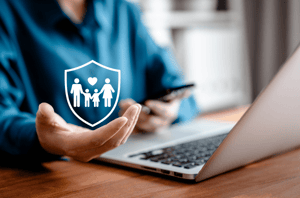It’s every parent’s worst nightmare.
A staggering 1 out of every 5 kids gets sexual solicitations online.
Strangers, predators, hackers, and cyber-bullies all target kids, and their work is made easier when their screen names show age, gender, or location.
To further complicate things, today’s parents must monitor a variety of devices, apps, and portals including Facebook, SnapChat, and Kik.
And the list keeps getting bigger every year.
So what are we as parents to do to adapt to this ever more challenging environment?
Here are 7 quick tips to keep your kids safe online:

1. Have an open talk with your kids about who and what is online – and what not to share
Today’s kids are digital natives, and they will use social media, chats, and other portals to gossip with friends, play games, share photos, find out about missed assignments, or connect with others about common interests.
While COPPA (Children’s Online Privacy Protection Act) prohibits kids under 13 from using social media, savvy youngsters have a knack for getting around these things.
Most of them do not realize however that there is a dark side to web, and it’s important for you as the parent to have the talk about these matters as soon as kids are navigating the internet on their own.
After you have “the talk” the next step is to encourage your child to feel comfortable bringing things to your attention.
Whether they find something inappropriate on YouTube or encounter strange behavior in a chat, you will want them to share this with you.
The next step is to tell them not to exchange personal information such as phone numbers, address, best friend’s name, pet’s names or pictures.
If there is ever a personal invite to a party or a personal meeting of any kind, they should tell you right away.
2. Set limits
The idea is simple, but effective. The less time kids have online, the less probable it is that they’ll run across something inappropriate.
Some helpful tips are to set daily limits for screen time, prohibit screen time during meals, and restrict screen time in the bedroom.
Other helpful advice is to allow your child unwind right after school to text/chat with friends, play games, or visit social networking sites, but make the computer a homework-only zone right after dinner.

3. Use parental control technology
You pay the bills; you set the rules.
The best way to limit screen time and monitor online behavior is through a parental control service.
We like solutions like CleanRouter, ContentWatch Net Nanny, and Qustodio Parental Control.
All three solutions allow parental control and monitoring for every device on your network, safe search enforcement, and device-specific Internet time scheduling. You can receive reports all sites visited and blocked, and you can also receive optional daily activity emails.
We cannot stress how worthwhile an investment a subscription service to parental control technology can be for busy parents.

4. Know what sites they visit and who they interact with online
Parental control technology like the ones we mentioned can give you quite a few details about sites visited.
But even so, you should make a habit of checking your child’s online viewing history. (For a tutorial on how to do this on all devices we recommend WikiHow as a resource).
If you find that your child’s search history has been erased, or that settings have been changed to Private mode, you should have a talk about it with your child and find out why.
Knowing who she interacts with online is more challenging, but there are a few things you can do.
Make sure to review her contact lists in all of the apps that she uses. Does she know everyone or are there any strangers, “friends of friends”, or the like? These people should be removed.

5. Know their passwords
Knowing your children’s passwords should be a mandatory part of your child’s right to use the device.
Establish early on that you will need to have their passwords for all of their accounts including social media sites.
It is essential that you check these sites fairly regularly to see monitor your child’s online behavior.
6. Put the computer in a central location that you can monitor
This is also a simple solution, but very effective. Put your child’s main homework computer in a central location in your house to give you a good vantage point.
A set up like this will discourage your kids from visiting inappropriate sites as they know that you or a sibling might walk by and see.

7. Teach your kids about their online reputation and digital citizenship
As always, teaching kids to treat others with respect and kindness starts by setting a good example at home.
Make sure that the manner in which they represent themselves online adheres to your family values, and explain that their behavior online is also a reflection of your family.
Point out to your kids that digital world is a lot like the regular world and the same manners and rules need to apply.
Teach your children early and often that what they say online becomes a permanent digital record.
Kids need to understand that saying mean or inappropriate things online or over a chat is never allowed. Explain what cyber bullying is and how harmful it can be.
Unfortunately many older students feel free to use profanity, engage in cyberbullying, and share inappropriate material online under the mistaken idea that they are anonymous.
When they are old enough, explain how this could not be further from the truth, and make it clear that nearly everything is stored, can be uncovered, and will be made public.
Conclusion
Keeping your kids safe online can be tricky, but if you follow the tips above, you will be on your way towards creating a safe and secure online environment for your child.
How did you like our article 7 Quick Tips to Keep Your Kids Safe Online?
Did we miss anything? If you have some other ideas to share, please leave them in the comments below.
7 Quick Tips to Keep Your Kids Safe Online

















